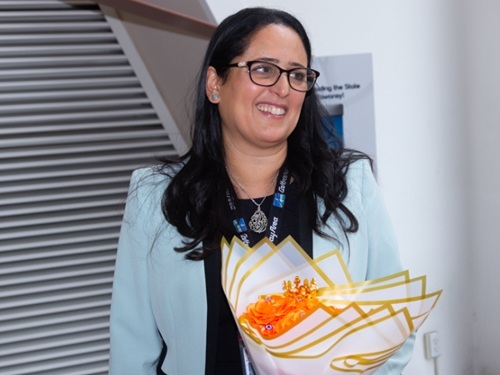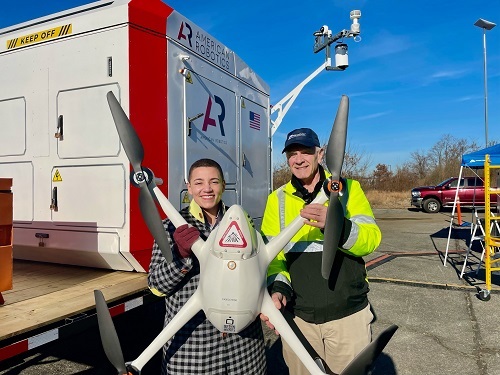The Federal Aviation Administration recently issued a wide-ranging drone waiver to the aeronautics division of the Massachusetts Department of Transportation that allows the agency to fly uncrewed aircraft over the state’s entire railroad network outside the remote drone operators’ fields of vision.
[Above photo by MassDOT]
Known as operating “Beyond Visual Line of Sight” or “BVLOS,” that capability allows MassDOT drones to more efficiently collect data on more than 1,000 miles of rail track when monitoring for impediments such as vegetation encroachment, flooding, or storm damage.
MassDOT partnered with the Massachusetts Bay Transportation Authority or MBTA and MITRE Corp. to devise a unique “blended” performance-based approach, providing flexibility to adjust operations according to variations in factors such as geography, urban density, or airspace.
For higher altitude flights, at over 50 feet and as high as 400 feet above obstructions, remote drone operators will rely on a visual observer to ensure safe separation between the drones and crewed aircraft.
However, for drone flights up to 50 feet above rail lines or up to 50 feet above obstructions, MassDOT Aeronautics has received a special “obstruction shielding” waiver, with which drones can fly BVLOS without the need for visual observers. This blended, flexible approach to operations will allow MassDOT to perform its mission more efficiently across a variety of landscapes with rail lines.

“We are grateful for the collaboration with our federal partners that has allowed MassDOT to adopt this drone waiver to fly BVLOS over our state rail lines,” said Monica Tibbits-Nutt, MassDOT secretary and CEO, in a statement. “Safety is a priority and this waiver will help us inspect our state rails more often while also doing so more safely.”
“Our latest BVLOS waiver not only marks a quantum leap for infrastructure inspection services in Massachusetts but provides a model for all states to inspect a variety of infrastructure more rapidly, accurately, and comprehensively,” noted Jeff DeCarlo, MassDOT aeronautics administrator
“This waiver also allows us to explore critical new ways to improve the state’s operations, from airspace monitoring to medical emergency response,” he said.
“We’re thrilled that MassDOT can leverage the latest technology to accelerate our infrastructure data collection process, which has typically been slow and labor intensive,” added Meredith Slesinger, rail and transit administrator for MassDOT.
“This allows us to expedite and improve the analysis of rail corridor conditions that impact safety, such as erosion, culvert obstructions, and storm damage, including in difficult-to-access rail corridors across our railroad network,” she said.
 States
States
Dina El-Tawansy Appointed Director of Caltrans
July 11, 2025 States
States

